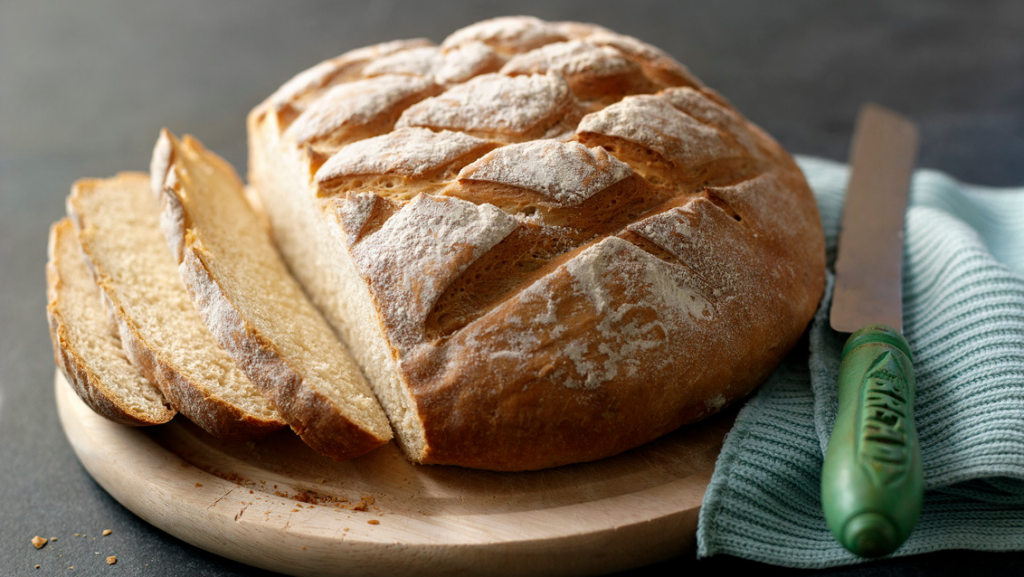Subtotal: $4.46
What Happens When You Eat Bread Every Day?
Bread has become a staple grocery item for many people today, but there is often concern about whether it is truly healthy and whether consuming it daily might have negative effects on the body. The following insights might help address some of your concerns.
Nutritional Information of Bread
Bread, particularly whole wheat bread, offers a variety of essential nutrients. According to the USDA, one slice of whole wheat bread (25g) provides:
- Calories: 77
- Carbohydrates: 13 g
- Fiber: 2 g
- Sugar: 1 g
- Protein: 4 g
- Total Fat: 1 g
- Saturated Fat: 0 g
- Sodium: 141 mg
Bread is a significant source of fiber, iron, and B vitamins, making it a valuable addition to your diet. However, like all foods, moderation is key, and overconsumption may lead to certain negative effects.
:max_bytes(150000):strip_icc()/6788-amish-white-bread-DDMFS-4x3-6faa1e552bdb4f6eabdd7791e59b3c84.jpg)
Reasons Why Paper Packaging and Cardboard Boxes are Environmentally Friendly: Click Here
Refer to BN Packaging’s paper cup products at: PRODUCT LIST
Increased Fiber Intake
Whether it’s white bread, whole grain, or sourdough, all types of bread contain fiber, an essential nutrient that supports healthy digestion. Fiber helps regulate the body’s use of sugars, helping to keep hunger and blood sugar in check. According to American nutritionist Kristi Ruth, whole grain bread, in particular, contains more fiber and helps keep you fuller for longer compared to other types of bread.
For instance, a slice of whole wheat bread contains about 2g of fiber, approximately 7% of the daily requirement, while some whole grain bread can contain 4-5g of fiber. This fiber contributes to a healthy digestive system and can help prevent constipation.
Elana Natker, from the Grain Foods Foundation, mentions that 40% of dietary fiber intake comes from grains. Removing grains like bread from your diet could significantly reduce the fiber your body needs, leading to digestive issues and other health problems.
While fiber can also be obtained from other foods like fruits and vegetables, cutting out bread entirely might limit an easily accessible fiber source. According to the American Journal of Lifestyle Medicine, 95% of Americans don’t consume the recommended amount of fiber (as of 2017).
However, high-fiber bread can cause discomfort for some people. While the body needs adequate fiber from various food sources, not everyone can handle the recommended 25-38g/day as per Dietary Guidelines for Americans. Overconsumption of high-fiber foods can lead to bloating, cramping, and discomfort. For those who don’t tolerate fiber well, it may be better to opt for white bread or sourdough, which contain less fiber.
Receiving Various Nutrients
All types of bread, even white bread, contain nutrients beneficial to the body. Along with high amounts of iron, fiber, and B vitamins, bread also provides protein, calcium, manganese, and zinc. These nutrients are vital for various bodily functions, including bone health, immune system support, and energy production. White bread, in particular, is a significant source of vitamin B9 (31% of the essential requirement), which is especially important for pregnant women as it helps prevent birth defects.

Impact on Blood Sugar Levels
Bread is a carbohydrate-rich food, and consuming it daily can lead to fluctuations in blood sugar levels. According to the Harvard T.H. Chan School of Public Health, while eating bread daily can help you meet your nutritional goals, it still contains carbohydrates that can cause blood sugar levels to spike, especially if consumed in large amounts or without other foods that help stabilize blood sugar.
When you eat bread, your digestive system breaks down the carbohydrates into sugars, which then enter your bloodstream. As blood sugar levels rise, your body releases insulin to help cells absorb the sugar, either for energy or storage. This process is natural, but if your diet is high in refined carbohydrates like white bread, it can lead to frequent spikes in blood sugar, which may increase the risk of developing insulin resistance or type 2 diabetes over time.
The less fiber a bread contains, the higher its glycemic index (GI). A high GI means the food is rapidly digested and absorbed, causing a quick rise in blood sugar levels. You can eat bread with healthy fats (such as avocado or olive oil) or lean proteins (such as turkey or chicken) to slow digestion and stabilize blood sugar levels. This is particularly important for those diagnosed with diabetes or at risk of developing it.
Potential for Weight Gain
Bread is a calorie-dense food, and consuming it in excess can contribute to weight gain, especially if the bread is not balanced with other nutrients in your diet. For example, white bread is often low in fiber and high in sugar, which can lead to overeating and weight gain.
Whole grain breads, on the other hand, contain more fiber and protein, which can help you feel fuller for longer and prevent overeating. However, even whole-grain bread should be consumed in moderation as part of a balanced diet to avoid excess calorie intake and potential weight gain.

Feeling Sluggish
Bread can quickly provide your body with energy from carbohydrates, but without healthy fats, protein sources, or high fiber to keep you full and energized for longer, it may leave you feeling sluggish. This is because refined carbohydrates, such as those found in white bread, are quickly digested, leading to a rapid spike in blood sugar followed by a crash, which can cause feelings of fatigue and sluggishness.
It’s essential to pair bread with foods that slow digestion and offer sustained energy, such as lean proteins, healthy fats, and high-fiber vegetables. This combination can help stabilize blood sugar levels, prevent energy crashes, and keep you feeling satisfied for longer.

Conclusion
In conclusion, while bread is a convenient and nutritious food, it’s important to consume it mindfully. Overconsumption can lead to issues such as blood sugar spikes, weight gain, and insufficient satiety. However, when combined with other nutrient-dense foods, bread can be part of a balanced and healthy diet. The key is to choose high-fiber, whole grain breads whenever possible, pair them with proteins and healthy fats, and enjoy them as part of a varied and balanced diet.
Address providing paper cups and paper cups in Perth City
Do you want to buy a large quantity of cheap paper food containers that are both reputable and safe? You hope to receive many benefits when buying from the company but don’t know where to buy paper food containers in Perth, WA?
Please quickly contact us, BN Packaging Company, which specializes in providing paper food container products from wholesale to retail at reasonable prices, as well as quality assurance.
As one of the leading companies in the industry of manufacturing and trading cheap paper food container products with many outstanding advantages such as:
– With many years of operation in the market, BN Packaging always learns and updates trends to meet customer needs. Our company has been able to cooperate with many famous brands in the domestic and international markets.
– We create diverse designs, suitable for each business. There are many beautiful and sophisticated designs to choose from, you will surely find a design that suits your feelings and needs.
Currently, BN Packaging’s cheap paper food container products have been distributed in many large and small supermarkets, convenience stores, and paper cup distribution agents on the market. Therefore, you can also find and buy cheap paper cup products from our Company easily.

 Round Container 750ml (24oz)
Round Container 750ml (24oz) 